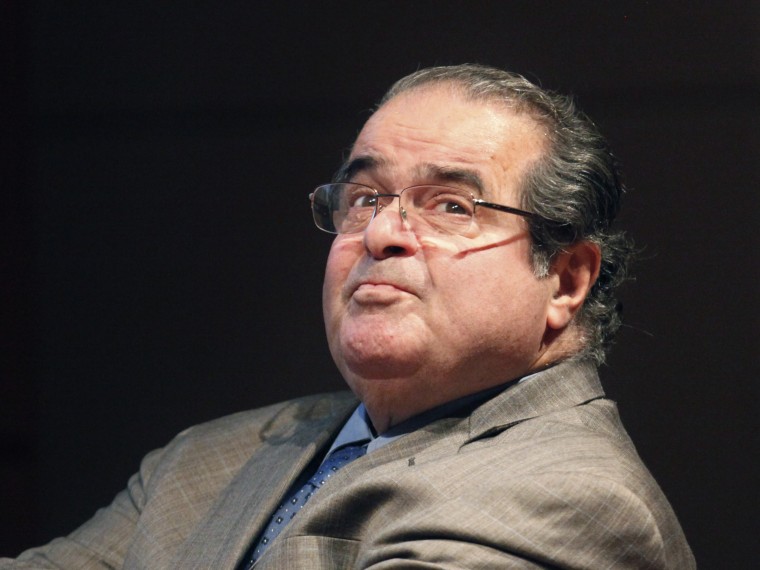Nothing sends Justice Antonin Scalia around the bend like a court that he thinks is flouting the will of Congress. That fact was on vivid display Tuesday: the Supreme Court ruled 5-4 that convicted prisoners with compelling evidence of innocence can file otherwise untimely petitions asking to be released. Scalia responded by calling the majority every name in his thesaurus.
Justice Ruth Bader Ginsburg’s majority opinion in McQuiggin v. Perkins was, according to Scalia’s dissent, full of “bizarre,” “feeble” logic that wouldn’t convince “a second-year law student.” That was so, he explained in classically scathing Scalia terms, because the majority decided to ignore the law and create a policy exception for prisoners who might actually be innocent. “With its eye firmly fixed on something it likes--a shiny new exception to a statute unloved in the best circles--the Court overlooks” the fact that federal statutes do not recognize this actual-innocence exception, Scalia wrote. “The Court simply ignores basic legal principles where they pose an obstacle to its policy-driven, free-form improvisation.”
Scalia’s rhetorical cannonball is noteworthy in part because of the voting lineup: Justice Anthony Kennedy, the court’s often-but-not-always-conservative swing vote, abandoned his conservative colleagues and joined the court’s more liberal wing, giving it the five votes needed to prevail. Conservative court watchers are waiting to see whether Kennedy pivots the other way when it comes to the high-profile decisions--including gay marriage and affirmative action--the court will issue next month.
But McQuiggin is also important as the latest round in a long-running Supreme Court fight over what to do with prisoners who claim to be innocent.
The case involves a Michigan man, Floyd Perkins, who has spent 20 years in prison for murder. In 1993, Perkins attended a party in Flint, Michigan, with a friend, Rodney Henderson, and an acquaintance, Damarr Jones. The three left the party together and Henderson was later found dead of stab wounds.
Police charged Perkins with the killing. At trial, several witnesses testified against him. Jones testified that he saw Perkins stab Henderson. Two other witnesses said Perkins confessed to them. Perkins was convicted and sentenced to life in prison.
That’s where the actual-innocence dispute comes in. Perkins filed a “habeas corpus” petition in federal court in 2008, asking for a new trial. He argued that he had received ineffective assistance from his trial lawyer. He also claimed to be innocent. In support of that claim, he submitted affidavits from three witnesses. One said Jones, the man who had testified against Perkins, had confessed to the crime. Another said she had heard that Jones confessed. And the third, a dry-cleaner employee, testified that shortly after the murder, Jones brought heavily bloodstained clothes in to be cleaned.
The problem for Perkins: his petition came too late under a 1996 federal statute called the Antiterrorism and Effective Death Penalty Act, or AEDPA. AEDPA says federal courts can’t grant habeas corpus relief unless the prisoner seeks that relief within a year after his conviction becomes final or within a year after he uncovers new evidence. Perkins’ petition didn’t fit into either box. His conviction became final in 1997, the last of his three new affidavits dated to 2002, and he didn’t file his petition until 2008.
Perkins nonetheless asked the federal court to hear his petition. He argued that there is an unwritten exception to the AEDPA time limits for situations where a prisoner can show he is actually innocent.
A deeply divided Supreme Court has now agreed. Justice Ginsburg explained that there is a narrow “miscarriage of justice exception” that lets courts ensure “that federal constitutional errors do not result in the incarceration of innocent persons.” That exception persists despite AEDPA, she wrote, because Congress knew it existed and didn’t take steps to do away with it when it wrote the statute.
Justice Scalia, joined by the court’s three other reliable conservatives, vehemently disagreed. The majority, he said, was committing the cardinal sin of judging: it was rewriting a statute. Congress decided in AEDPA that prisoners must bring new evidence to court within a year, even if that evidence shows actual innocence, and if they don’t they are barred from court. The Supreme Court was not at liberty to overrule Congress on that point. “Where Congress has enacted a constitutionally valid barrier to habeas relief,” Scalia wrote, “a court cannot decline to give it effect.”
McQuiggin will not change the result in most habeas cases. In fact, it probably won’t even help Perkins: Justice Ginsburg signaled that Perkins’ affidavits are not enough to show actual innocence--and therefore not enough to get him into court--although she left that to a lower court to decide. The decision nonetheless is a victory for groups such as the Innocence Project that sometimes bases habeas filings on evidence that is not new. And it is a victory for the Supreme Court’s left wing in a long-running battle over the court’s role. The upcoming gay-marriage and affirmative-action decisions will provide more context--and, undoubtedly, more debate.
